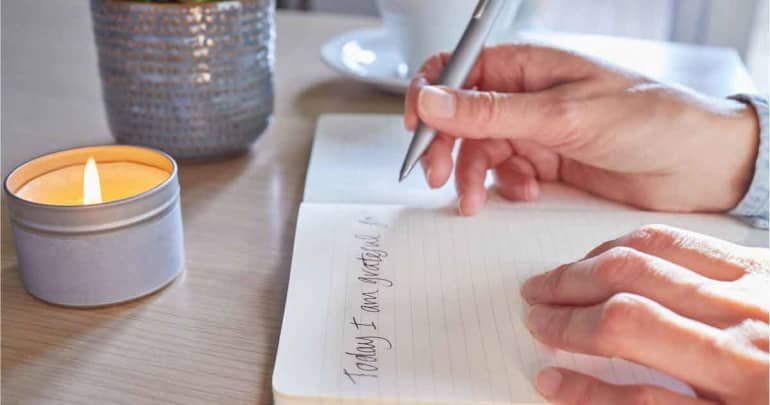Journaling is often touted as a potent recovery strategy that can help you navigate challenges caused by addiction, anxiety, depression, stress, and other mental health disorders. Despite the efficacy of journaling, many in recovery are doubtful or reluctant to try journaling. This reluctance is unfortunate as journals are a powerful guide to recognizing and processing emotions and stresses. Journaling can also take many different forms and be personalized to meet your specific recovery needs.
The Many Forms of Recovery Journals
Taking pen to paper can be a powerful experience for those navigating the complexities of their recovery journey, whether one is coping with their newfound sobriety following addiction or learning to navigate the intricacies of their mental health needs. This approach is also an effective mindfulness exercise, helping the journaler focus on the physical act of writing and feeling their utensils glide across the page in a comfortable, safe environment.
While this mindful journaling can be effective for some, not all will want to incorporate this into their practice. Journaling can take many other forms to fit one’s daily needs and developing lifestyle.
Digital spaces also offer many platforms for journaling. Even texting a short message to oneself on one’s phone can be a valid journal entry. For some, typing in a digital space can allow one to get their thoughts down more quickly than writing by hand.
Digital spaces can sometimes provide an additional layer of privacy for those concerned about leaving a physical journal out and about. Not every aspect of one’s recovery journey needs to be on display for all to read, and journals can be a space that allows for negative feelings to be safely expressed. Having password-protected accounts for digital journals or a private space to store physical journals provides the privacy and safety necessary to make the most of one’s journaling efforts.

Journaling in addiction recovery offers dozens of benefits, from offering a place to process thoughts to helping bring back long-forgotten memories.
More infoThere Is No Right or Wrong Way
Journals do not have to be anything grand, and there is no set amount that one has to write to be considered journaling correctly. While many people choose to use journals to keep a chronicle of their day-to-day life and feelings, there are no specific rules for what can go in your journal. Some choose to keep journals of descriptions of smells they have encountered or dreams they have had.
A journal does not even have to be made up of written text. People keep visual and aural journals in addition to the more traditional written journal. Likewise, there are no set requirements for how long or how often one is supposed to write in one’s journal. While some choose to write pages a day, others will log a sentence a week.
Another aspect of journaling is that you are your own reader and do not need to be self-conscious. With journaling, no one is looking over your shoulder to correct your spelling or grammar or otherwise judge the content of your words. Journals exist wholly for one’s own benefit and are a self-created therapeutic tool with a number of advantages for those navigating recovery and sobriety.
The Advantages of Journaling
Journaling offers several benefits to those in recovery. For some, understanding daily stresses and routines and their influence on one’s use of addictive substances or mental health can be challenging to put together. This can be especially true if depression, anxiety, or cravings may still be prevalent on a daily basis.
Writing out where one went, the people one was with, and the feelings these people and places engendered can help those in recovery create sometimes revealing connections. Journaling can help one identify areas of high stress or influences that may continue to negatively impact one’s recovery or sober goals. Not only can this information be used to further personalize one’s recovery efforts, but the information gathered via journaling may also aid in creating effective relapse prevention plans.
Others may find that having an outlet to express their feelings is a powerful tool. Emotions, especially intense emotions such as anxiety, sadness, or anger, are not something that will go away inherently. Instead, they can continue to build beneath the surface until they express themselves in potentially destructive ways. Simply writing out these intense feelings can sometimes give them an outlet and form that is easier to identify and process. If one has intense feelings of anger, writing can be a way to express these feelings safely.

You may feel tempted to replace your drug addiction with a behavioral addiction. Instead, you can find healthy ways to cope with feelings.
More infoFinding Your Form
For some, journaling negative emotions is a great way to process them without succumbing to other, less constructive coping strategies. Others may want to journal their accomplishments and successes to create a document filled with happy reminders to help keep them motivated and resilient through more difficult times. Still, others may use journals daily to mark both the highs and lows alike.
Each form of recovery journaling is equally valid. Finding the format that works for each individual is a part of what makes journaling so powerful. It is an exercise in personal agency and is easily modifiable to help each individual get the most from the practice.
Journaling is just one strategy among many that can be incorporated into your recovery plan at Hawaii Island Recovery. We understand the personal nature of addiction, mental health disorders, and recovery. Our Hawaii recovery center is prepared to help you understand and personalize your recovery efforts to best reflect your needs and goals. From cognitive-behavioral therapy to medically-assisted treatment to cultural and experiential therapies and spiritual practices, we are committed to helping you realize your transformative goals and create a new, healthy lifestyle in recovery and sobriety. From the unique opportunities on the big island of Hawaii to continued ongoing support, we are a resource for you from your first step to your sustained healthy recovery. For more information on how we can personalize your time with us, or to speak to a caring staff member about your needs and goals, call us today at (866) 390-5070.
 Hawaii Island Recovery
Hawaii Island Recovery 










